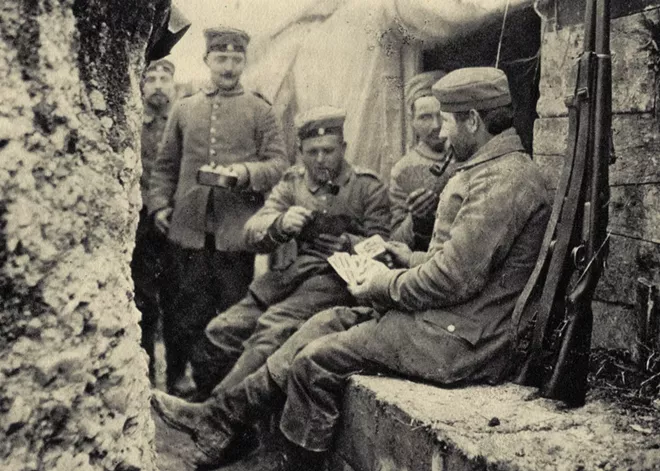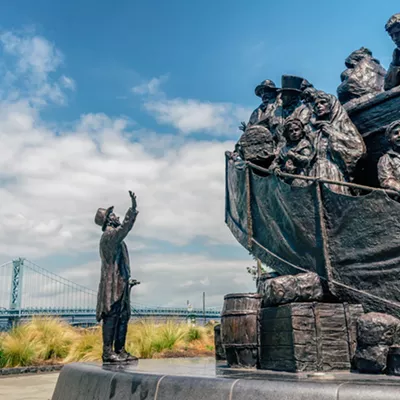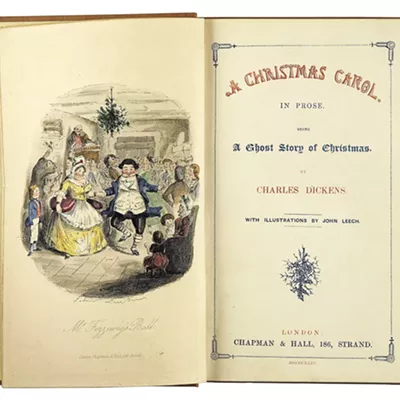"Peace." A vacuous holiday card message. Commerce appropriates cherished aspirations such as Peace and commodifies it into Hallmark banality and Christmas kitsch. After all, Peace may sell in December, but war is perennially more lucrative.
For many Peace would be respite from exhausting holiday rituals of the nomadic shopping scrum, triaging hemorrhaging credit cards, torture by Muzak "Jingle Bells" earworms, too many Santas and minimum wage elves, hair-on-fire cooking and cleaning, decking the halls to Chip and Joanna's specs, and placating irascible relatives.
This season a salutation of "Peace on Earth" might evoke cynicism if not despair. As charlatans infect our body politic, Putin ravages Ukraine and the Israeli-Gaza carnage confounds, this is a dark winter of discontent, perhaps a convulsive awakening from our age of insular innocence.
Yet for one brief, shining moment during the First World War, better angels transcended our latent savages. German, British and French conscripts, some only 16 years old, fraternized with those they were recruited to kill, a court-martial level offense. (See the 2005 film Joyeux Noel.) This war was an unprecedented massacre of innocents, a generation lost. Unlike Abraham and Isaac, the drums of war summoned sons to be sacrificed, but it was not God's command but the false idol of nationalism.
This "war to end all wars" was a duel of dynastic cousins, tragic miscalculations and industrialized slaughter, fought ostensibly "to make the world safe for democracy," causing the converse in Russia and Germany and gestating the Hydra of 20th-century wars.
By December 1914, four months into the conflagration, the fog of war had descended on the Western Front. The entrenched front would be a four-year stalemate of deadly mechanized lethality and attrition. The German artist Otto Dix described the lacerated trench landscape as "lice, rats, barbed wire, corpses, blood, liquor, filth, bullets, bombs, fire and steel. That's war. It is the work of the Devil." By Christmas Eve there were 2 million casualties, including 500,000 killed on the Western Front. (Watch 2022's All's Quiet on the Western Front and 2011's Warhorse.)
The Christmas Truce of 1914 was initiated by common enlisted soldiers. On Christmas Eve, Germans adorned the parapets of their trenches with decorated evergreens. (Recall the pre-Christian, Germanic origin of the tannenbaum, a winter solstice totem to ensure a spring resurrection.) The rapid rattling of cold metallic, flesh-eviscerating machine guns was blessedly silenced by German Christmas hymns. Apart from the distant, stuttering cacophony of a few angry guns, there were the raspy harmonies of "Stille Nacht," voices hoarse from the cursing and crying after months of futilely fatal offenses.
As the German repertoire changed to spirited English hymns, entrenched British soldiers joined the chorus; yet fearing a ruse, emerged tentatively from the muddy, stinking morass. It was like a harrowing of Hell, a divine deliverance. They met and mingled unarmed and without malice in No Man's Land, once a Flanders field of lilies. Yesterday Death scythed its grim harvest, this ground desecrated by profane blood, now consecrated by miraculous camaraderie and Peace. Perhaps only those having choked on the rancid taste of war can truly savor the sweet wine of Peace.
First the dead beckoned to be buried. Working side by side, Germans and British interred each other's brothers-in-arms, recited the Psalm 23 in both languages, then toasted each other with Deutsche schnapps, exchanging simple gifts of tobacco, chocolates, newspapers and addresses with oaths that, "When this bloody war soon ends, we'll quaff a pint of Newcastle or Hofbräu together!" A British corporal effused: "Here we are laughing and chatting with men whom only a few hours earlier we were trying to kill!" Alas, they were blood: The Germans were Saxons, Victoria's Prince Albert was Saxon, and the English are Anglo-Saxons.
There were improvised soccer matches accompanied by ribald renditions of "God Save The King" and "Die Wacht am Rhein." A German barber trimmed hair and shaved British soldiers and with a flourish of his open razor wryly jested, "Maybe I should cut your throat today and save tomorrow's ammunition?" To British soldiers, German humanity was a shock after the incessant propaganda about Teutonic bestiality. Alas, in war's shadow there is "light that we cannot see."
Not all troops along the 760-kilometer front fraternized. There was predictable subterfuge, some exploiting the truce to snipe exposed enemies or to do clandestine reconnaissance. Many French were wary as the Germans humiliated France in the 1870-71 Franco-Prussian War, and by Christmas Eve of 1914, the Germans were 60 kilometers from Paris. A French newspaper declared that, "Any soldier found guilty of conversing with the enemy will be shot for treason." British authorities issued similar menacing invectives. The soldiers' common retort: "If they killed us all, there would be nobody left to fight their damn war!"
In the German ranks, the Prussians remained obstinate — despised by other German soldiers and ferociously fervent to their heel clicking, goose-stepping, iron and blood, haughty esprit de corps. An Austrian corporal who was supplicant to this severe Prussian ethos, who never spoke of or received letters from family or friends, neither smoked or drank, was vegetarian, shunned women and brooded alone in the trench, was Adolf Hitler, who chastised the soldiers who fraternized with the enemy: "Have you no German sense of honor?"
On Dec. 26, Gen. Sir Horace Smith left the cushy comfort of his chateau headquarters ensconced several kilometers behind British lines demanding that fraternization cease else the offenders be subject to severe disciplinary action. "Friendship between the trenches is forbidden!" Thus did the senseless slaughter resume and over the next 46 months, 6,000 soldiers died per day on the Western Front.
If the bitter belligerents of World War I could conquer their "hard-favor'd rage" with compassion, in this sacred season could we not forsake the schadenfreude that enshrouds our hearts with darkness and light a candle of Goodwill? This simple gift, sole cost only what the soul can tender, is the essence of a Peace that we can truly rejoice. ♦
John Hagney taught high school and college history for 45 years. He was a U.S. Presidential Scholar Distinguished Teacher. His oral history of Gorbachev's reforms was the first work on the subject and has been translated into six languages.
























